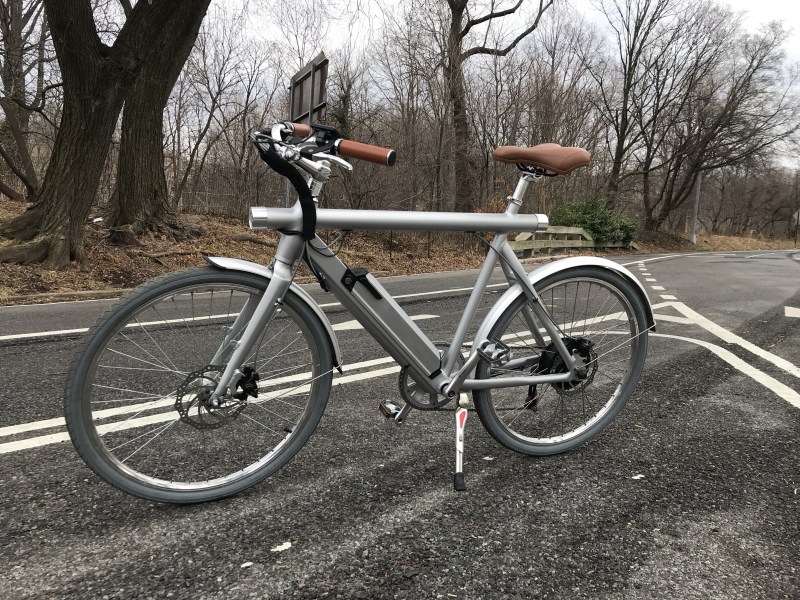Check, please!
Brooklyn Assembly Member Bobby Carroll wants the New York State Energy Research and Development Authority to expand its electric car subsidy program to include electric bikes — with the state picking up half the cost of the miracle riding machines up to $1,100.
“The majority of New York City residents don’t own a car, and therefore cannot benefit from the current rebate program,” said the Park Slope Democrat. “And this can democratize biking because not everyone is physically up for cycling.”
The state’s current “Drive Clean” program offers a direct, point-of-sale rebate of up to $2,000 to buyers of electric cars — but the program inexplicably does not include equally greenish electric bikes.

“By offering a rebate, we can remake the existing electric subsidy program into a more progressive version of itself, bringing into the fold an even more affordable and sustainable form of transportation with additional benefits,” Carroll told Streetsblog of his bill, which he introduced last week.
Carroll also believes that an e-bike subsidy will make a far greater impact on sales than the e-car subsidy — because $2,000 doesn’t go very far when the price of electric cars can easily top $50,000. But halving the price of an electric bike would make the electrified rides affordable to more people. Many models can be obtained for $2,200, earning the full $1,100 rebate, though electric cargo bikes, which truly replace cars, are more expensive.
Studies have shown that the cost of an e-bike is a serious barrier to entry. But other studies show that electric bikes quickly replace car trips because more than 59 percent of auto trips in this country are under six miles, which is right in the wheelhouse of an electric bike.
“A bike with a good basket or two can eliminate the idea that someone needs a car,” he said. “And there are going to be a lot of people for another six to nine months who don’t want to take the subway. And we can’t have a car recovery. We can’t say, ‘You’re scared of the subway? Take a car.’ That would be a traffic nightmare.”
Plus, reminder, we’re in a climate crisis and e-bikes are an ideal car replacement technology, as Eben Weiss has pointed out in Outside magazine.
The best part? There’s no catch. The existing “Drive Clean” program is fully funded, thanks to a surcharge on Con Ed bills. And the initial lockbox of $55 million for car subsidies still has $13 million in it, Carroll said — and when that’s spent, the fund is replenished with more energy bill surcharges.
“So even in these lean budget times, NYSERDA can do this,” Carroll said. “They have not been burning through the car portion of the fund and e-bikes would not be so popular to bankrupt the fund.”
Many governments subsidizes the purchase of e-bikes. In the Yukon, buyers get $750 (Canadian) towards a new e-bike. And Paris is giving buyers $550 as a subsidy. California runs something of a “cash-for-clunkers” program that subsidizes e-bike purchases when a low-income resident trades in an old car.
The Yukon government just announced a rebate program for e-bikes!! $750 for a new e-bike & $1500 for an e-cargo bike. Great news! #bikefriendlycanada #bikestories https://t.co/JnciFxNsz8
— Vélo Canada Bikes (@Canada_Bikes) September 16, 2020
Carroll said he worked with the New York chapter of the Democratic Socialists of America, which has been leading on “green New Deal”-type transportation issues.
“For us, this bill is a no-brainer,” said Nicole Murray of the DSA. “It’s important for delivery workers, who rely on these bikes. But it’s not limited to workers; it’s for anyone who needs to get around and is not properly served by transit. Everyone should benefit from a subsidy that isn’t just for a two-ton vehicle that still needs to be stored somewhere in the city.”
Carroll admits that the bill might get some opposition from “people who think e-bikes are dangerous because some people misuse them,” he said, but added, “That’s the fault of our local Department of Transportation, which has not done enough to redesign our streets so they are safe. Blame the roadway, not the e-bike.”






